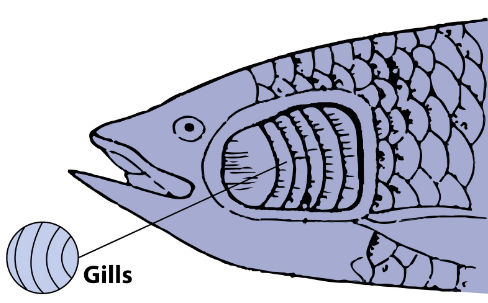
What are gills? What purpose do they serve in fish?
Answer
524.4k+ views
Hint: The process of formation of energy is called the Respiration which is helpful in the regulation of various metabolic processes that occur in the body. The energy produced in this process is utilized to complete various processes and to form end products.
Complete answer:
Respiration is the process of inhaling oxygen and exhaling carbon dioxide, it takes place through various organs depending upon the animals and their habitat. The gills are the organs that help the fish to undergo the process of respiration under the water. These organs are made up of proteins and are in the form of a thread-like structure. They help in exchanging various ions, gases, etc.
The fishes just like animals need oxygen for their survival. The fishes instead of breathing the oxygen extract it from the water that surrounds them. This is a difficult task as the air is observed to hold 33 times more oxygen than water thus fishes need a specialized organ for themselves to breathe.
The fishes have developed their specialized organ called gills that help them to breathe oxygen and to overcome their oxygen-deprived environment. From the surrounding water, the fishes absorb oxygen through their gills and transport it to the blood. This diffusion of oxygen to the blood is possible only when the concentration of oxygen is more in water in comparison to the blood. Thus it is said that the rate of breathing in aquatic organisms is much faster than in terrestrial organisms because the amount of dissolved oxygen is fairly lower in water than air and also that aquatic organisms like the fishes obtain oxygen from water present in the dissolved state.

Note:
The process of respiration is not the same in various organisms. The change of gases in the case of the unicellular animals occurs through the surface of the cell such as amoeba. The gaseous exchange occurs through the lungs in the case of the humans. The gaseous exchange occurs through the skin in the case of the earthworms. In insects, respiration occurs through the trachea while in aquatic animals it occurs through gills mostly.
Complete answer:
Respiration is the process of inhaling oxygen and exhaling carbon dioxide, it takes place through various organs depending upon the animals and their habitat. The gills are the organs that help the fish to undergo the process of respiration under the water. These organs are made up of proteins and are in the form of a thread-like structure. They help in exchanging various ions, gases, etc.
The fishes just like animals need oxygen for their survival. The fishes instead of breathing the oxygen extract it from the water that surrounds them. This is a difficult task as the air is observed to hold 33 times more oxygen than water thus fishes need a specialized organ for themselves to breathe.
The fishes have developed their specialized organ called gills that help them to breathe oxygen and to overcome their oxygen-deprived environment. From the surrounding water, the fishes absorb oxygen through their gills and transport it to the blood. This diffusion of oxygen to the blood is possible only when the concentration of oxygen is more in water in comparison to the blood. Thus it is said that the rate of breathing in aquatic organisms is much faster than in terrestrial organisms because the amount of dissolved oxygen is fairly lower in water than air and also that aquatic organisms like the fishes obtain oxygen from water present in the dissolved state.

Note:
The process of respiration is not the same in various organisms. The change of gases in the case of the unicellular animals occurs through the surface of the cell such as amoeba. The gaseous exchange occurs through the lungs in the case of the humans. The gaseous exchange occurs through the skin in the case of the earthworms. In insects, respiration occurs through the trachea while in aquatic animals it occurs through gills mostly.
Recently Updated Pages
Master Class 11 Computer Science: Engaging Questions & Answers for Success

Master Class 11 Business Studies: Engaging Questions & Answers for Success

Master Class 11 Economics: Engaging Questions & Answers for Success

Master Class 11 English: Engaging Questions & Answers for Success

Master Class 11 Maths: Engaging Questions & Answers for Success

Master Class 11 Biology: Engaging Questions & Answers for Success

Trending doubts
One Metric ton is equal to kg A 10000 B 1000 C 100 class 11 physics CBSE

There are 720 permutations of the digits 1 2 3 4 5 class 11 maths CBSE

Discuss the various forms of bacteria class 11 biology CBSE

Draw a diagram of a plant cell and label at least eight class 11 biology CBSE

State the laws of reflection of light

10 examples of friction in our daily life




